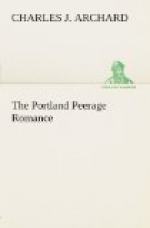The Duchess on one occasion made some observations in public on motors, and expressed a doubt as to whether any of her friends would forsake the horse in favour of mechanical locomotion. That time, however, came about, and now the Duchess is claimed as a patroness of the car, which if prosy, compared with the delights of horsemanship, is, nevertheless, useful for accomplishing distances which horses are not expected to cover.
In a speech in the House of Lords, the Duke said he considered the advent of the motorcar could not but have a weakening influence on the horse-breeding industry, and before very long several of the functions which horses at present perform, both in the towns and country districts, would be carried out by mechanical means. His object in making these remarks was to call attention to what was impending in order that some steps might be taken to foster the horse-breeding industry.
As far as a continuance of interest in race-horses is concerned, the Duke had at the commencement of the season 1906 twenty-one horses in training with W. Waugh at Kingsclere, including thirteen two-year-olds.
Both King Edward and the Queen have been entertained at Welbeck since their accession to the throne, and in 1906 there was a visit from the Duke and Duchess of Sparta, the Crown Prince and Princess of Greece.
The Duke’s sentiments on “patriotism” may be gathered from some remarks he made when opening a miniature rifle range constructed at the Nottingham High School. He referred with approbation to the work of Mr. Robins, Premier of Manitoba, through whose policy the Union Jack was unfurled from the roof of every school in the province: “The man who objects to perpetuating the glories of the flag, who declines to have his children infused with British patriotism is undesirable.” “These words,” said the Duke, “apply to the anti-patriot, the pro-Zulu, the pro-Boer, the inciter to rebellion in Egypt, and to the stirrer-up of strife in India. I do not see why rifle-shooting should not become a popular national sport, equal in prestige to games like cricket and football.”
CHAPTER IX
THE DUKE AND DUCHESS AT HOME.—THE DUCHESS AS PRINCESS BOUNTIFUL.—THE DUCHESS AT COURT
Christmas is usually spent by the Duke and Duchess at Welbeck, and one of the events of the season is the Household Ball to celebrate the Duke’s birthday, which falls on December 28th. It is held in the vast underground picture-gallery, with the subjects of the old painters looking down from their canvases upon the gay dancers.
Choice exotics, stately palms and seasonable shrubs add to the variety of the decorations. The band is almost hidden in a bower of foliage in the centre of the great saloon, and there are 500 guests of all ranks of society from peers and peeresses to the humblest domestic servant.
About ten o’olock the Duke and Duchess appear with their house party, and dancing commences with a Circassion Circle. The Duke has the housekeeper for partner and the Duchess the house-steward, while the aristocratic guests find partners among other chiefs of departments in the Welbeck household.




